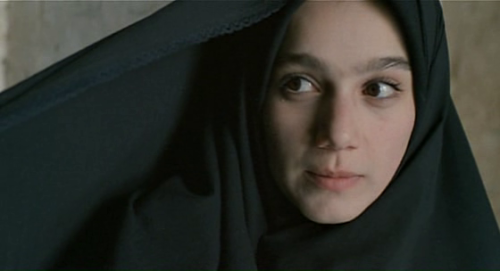
In 1974, Mohsen Makhmalbaf stabbed a young police officer while attempting to steal his gun. Makhmalbaf was only seventeen at the time but had already been actively involved for a number of years in organized resistance to the Shah’s government. He served four-and-a-half years of his sentence before being released in 1979, soon after the Islamic revolution.
During his time in prison, Makhmalbaf shifted his focus from political action to the arts, and over the next decade he established himself as an important writer and filmmaker, gaining a large audience both in Iran and abroad. One of his earliest films, The Cyclist (1987), is number 50 on the Arts and Faith Top 100 [2010 list] and is a key movie in what has since become known as the New Iranian Cinema movement. Close Up (1990, #34 on the 2010 list) and The Wind Will Carry Us (1999, #57 on 2010 list), both by Abbas Kiarostami, are other seminal works.
Nearly twenty years after the stabbing incident, the police officer Makhmalbaf had wounded showed up at the director’s door, asking to be given a role in his next film. That encounter is the inspiration for A Moment of Innocence, which reenacts their experience from both men’s points of view. A Moment of Innocence is not at all a typical historical film, however. Rather than simply setting his film in 1974, Makhmalbaf takes us behind the scenes of how such a film might be made. Like Stanley Donen’s Singing in the Rain (1954), Frederico Fellini’s 8 1/2 (1963), and Olivier Assayas’s Irma Vep (1996), A Moment of Innocence is one of the great movies about the process of making movies.
A Moment of Innocence is also a classic postmodern text. One of the central concerns of postmodernism is the unknowability of a historical truth once it’s been filtered through a culture saturated with images—movies, tv, photographs, advertisements. To borrow Stephen Colbert’s wonderful neologism, to acknowledge the “truthiness” of an event is to open all kinds of philosophical, political, and theological cans of worms. Like many other postmodern artists, Makhmalbaf responds by being self-reflexive and ironic and by balancing dry humor with sincerity.
For example, early in A Moment of Innocence, the policeman—now in his mid-40s, tall, gangly, with deep set eyes, an expressionless face, and thick eyebrows—is given the opportunity to cast the actor who will play the younger version of himself. After briefly interrogating the ten or so hopefuls, he chooses the best-looking and most charming one, a boy with fair skin and blue eyes.
Minutes later, the policeman storms off the set after Makhmalbaf (playing himself) rejects his choice and selects, instead, a less attractive actor. (In a related joke, the policeman often expresses his frustration over being cast repeatedly as the villain in other films.) The temptation to idealize our stories and ourselves, to rewrite history, to accept our subjective memories as truth is strong, particularly in an age that prizes beauty and commercial success above all.
Ultimately, it’s impossible for us as viewers to know exactly where the lines between fact and invention, documentary and fiction are being blurred here. Even the most fundamental question—Is this an accurate representation of what happened that day in 1974?—can’t be answered.
But, finally, the “truthiness” of A Moment of Innocence is beside the point. In the closing minutes of the film, when we finally see the encounter between the two young men (teenaged boys, really) we’re made suddenly aware of how both lives were ruptured that day and all irony drops from the film’s title. Makhmalbaf manages what few other filmmakers have been able to accomplish: he captures the sorrowful tragedy of any lapse into violence.
—Darren Hughes (2010)
- Directed by: Mohsen Makhmalbaf
- Produced by: Abolfazl Alagheband
- Written by: Mohsen Makhmalbaf
- Music by: Madjid Entezami
- Cinematography by: Mahmoud Kalari
- Editing by: Mohsen Makhmalbaf
- Release Date: 1996
- Running Time: 78
- Language: Persian
Arts & Faith Lists:
2006 Top 100 — #93
2010 Top 100 — #62
2020 Top 100 — #29